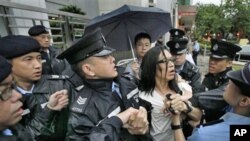China issues a scorecard on its human rights progress each year, offering a distinct view from that of international groups monitoring the country’s situation.
This year’s report pays special attention to improved living standards, including increased access to television and Internet, which is tightly controlled. Researchers said a top accomplishment is a 34 percent increase in private car ownership last year.
VOA spoke with Christopher Hughes of the London School of Economics and Political Science about how China’s view of itself affects its relationship with the world.
Why is China focusing on car-ownership in a report about human rights?
This goes back a long way, right back to the Cold War and the establishment of the U.N. and the various international agreements on human rights, when the Communist bloc always said that it wasn't just civil and political rights but equally important or, in fact, more important were social rights and economic rights and rights to development. So their argument is that it doesn't make sense to talk about civil and political rights when people are hungry. I think the problem for China now is that they've already reached a level of material development that's pretty good. And they themselves face a dilemma because they really don't know whether to see themselves as a developing country anymore or as a superpower. And China has these two faces.
It seems like China is sending a pretty unambiguous message to the world that it is a developed country, as seen in its recent dispute with Japan.
It says that through its actions, but then their own premier, Wen Jiabao, made a statement emphasizing that China is still a developing country and should be treated as one. And so they really want it both ways. When it’s convenient, they'll say they're developing and they need aid and special treatment and concessions. But on all those other issues, like asserting their claims to territory, dealing with Japan or India or even the U.S., suddenly they seem to have pretty advanced capabilities.
How do you see this dichotomy playing out on the international arena?
Well, I think we are entering a very difficult period, and the clash with Japan in recent weeks was just one of many of these problems that China is becoming more assertive over. China for many years has been insisting that its economic rise will be peaceful, but its behavior really since about 2008 and the financial crisis, where China has sort of got a new confidence that the U.S. is in decline in some sense or is relatively weak and distracted, and China's time has come. Since then, its behavior has started raising a lot of questions over its intentions and how it's going to use its growing power.











